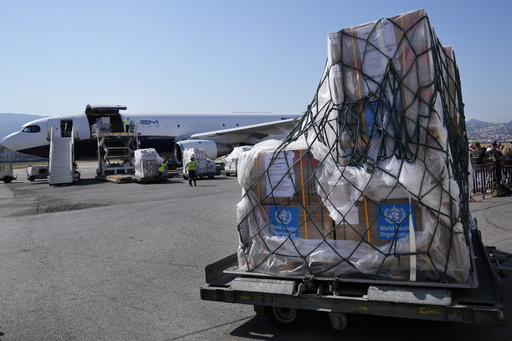
GENEVA — The head of the World Health Organization (WHO) urged global leaders to encourage the United States to reconsider its withdrawal from the organization, highlighting potential repercussions for public health data and disease outbreak responses. During a private meeting with diplomats last week, the director-general cautioned that the U.S. would lose access to crucial information concerning global health crises.
Concerns were raised during a key budget discussion, with representatives from various countries questioning the WHO’s strategies for dealing with the financial impact of losing its largest donor. German envoy Bjorn Kummel expressed urgency, stating, “The roof is on fire, and we need to stop the fire as soon as possible.”
In the budget for 2024-2025, the U.S. is expected to contribute nearly $988 million, making up approximately 14% of the WHO’s total budget of $6.9 billion. Internal documents reveal that the organization’s emergency health programs heavily depend on U.S. funding, with the European office’s “readiness functions” relying over 80% on the $154 million U.S. contribution.
The documents indicated that U.S. support is critical for many large-scale emergency operations, covering up to 40% of costs. The absence of American funds puts initiatives in regions like the Middle East, Ukraine, and Sudan at risk, and it jeopardizes significant funding for polio eradication and HIV/AIDS programs. The U.S. also funds the majority of TB programs in Europe and significant portions in Africa and the Western Pacific.
During a subsequent private meeting titled “Impact of U.S. Exit,” WHO finance director George Kyriacou warned that, if spending continues at the current pace, the organization could face financial instability by early 2026. He remarked that the ongoing expenditures “are not sustainable.” Following the executive order from the Trump administration, WHO has sought to retrieve funds for prior expenses, though many requests have reportedly been denied.
Kyriacou highlighted that the U.S. has not yet resolved its financial commitments for 2024, further straining the agency’s financial situation. WHO’s executive board, comprised of 34 senior officials including health ministers, was slated to address budgetary issues starting Monday, with discussions lasting through February 11.
During the budget meeting, Director-General Tedros Adhanom Ghebreyesus assured delegates that the WHO continues to share valuable data with U.S. scientists, although details about the information being shared remain unclear. He appealed to member nations for assistance in urging U.S. officials to reconsider their withdrawal.
Amid multiple health emergencies, such as Marburg virus outbreaks in Tanzania and Ebola in Uganda, Tedros refuted three key reasons stated by Trump for the U.S. exit, emphasizing that the WHO acted quickly in alerting the world about the coronavirus threat in January 2020 and has since implemented numerous reforms to enhance its operations. He maintained that the departure of the U.S. isn’t solely about financial matters but rather the detrimental loss of essential health information that could compromise future responses to outbreaks.
Kummel referred to the U.S. withdrawal as “the most extensive crisis the WHO has faced in decades,” prompting questions from representatives of countries including Bangladesh and France regarding contingency plans for the potential loss of U.S. funding and the consequent impact on health programs.
Options circulated among WHO senior leaders included proposals to cut funding for major departments by significant margins if U.S. financial contributions were lost. The organization has refrained from commenting on the nature of any private discussions between Tedros and member states regarding lobbying efforts.
While some experts noted that the U.S. departure could be catastrophic, they also suggested this could serve as an opportunity to reassess and enhance global public health strategies. Georgetown University’s Matthew Kavanagh pointed out that the U.S. allocates less than 1% of its health budget to the WHO, receiving considerable benefits in return, such as global epidemic intelligence and vaccine samples. He called the WHO “massively underfunded” and described contributions from wealthier nations as meager.
WHO emergencies chief Dr. Michael Ryan characterized the U.S. exit as “terrible,” while acknowledging that member nations have the capacity to bridge the gaps left by its departure. He poignantly noted, “The U.S. is leaving a community of nations,” underscoring the disconnect created by this decision.
Kavanagh expressed skepticism about the U.S.’s ability to gather information on emerging health threats effectively without the framework provided by the WHO, predicting that this exit would lead to detrimental health outcomes for Americans, though the extent of this impact remains uncertain.

